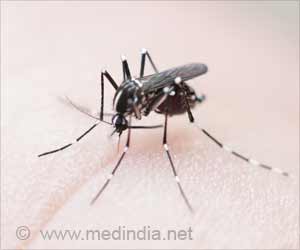Scientists in Taiwan believe they can explain how a form of dengue fever, a mosquito-borne disease that is triggering widening concern, reaps its deadly toll.
Scientists in Taiwan believe they can explain how a form of dengue fever, a mosquito-borne disease that is triggering widening concern, reaps its deadly toll.
Dengue is caused by four types of virus. Infection with any one of these viruses causes a mild fever and lifelong immunity to that strain.But a secondary infection by a different strain boosts the risk of dengue haemorrhagic fever, with internal bleeding, which can progress to the life-threatening dengue shock syndrome.
It is still unclear how this secondary infection is able to cause such serious symptoms.
One of the known factors, though, is an over-reaction by part of the immune system -- a "storm" by agents called cytokines, which run amok and cause tissue inflammation.
Reporting in Thursday's issue of Nature, researchers led by Shie-Liang Hsieh of the National Yang-Ming University in Taipei say that the cytokine storm is unleashed by interaction between the dengue virus and a molecule called CLEC5A located on immune cells.
They used antibodies on lab mice to interfere with the contact between the virus and the CLEC51. They found that this prevented inflammation but did not prevent the rest of the immune system from operating normally against infection. Fifty percent of mice treated with the antibodies were able to get rid of the virus.
Advertisement
Around 50 million people become infected with dengue each year, of whom around 24,000 die. About 2.5 billion people worldwide are at risk of infection.
Advertisement
Source-AFP
SRM










